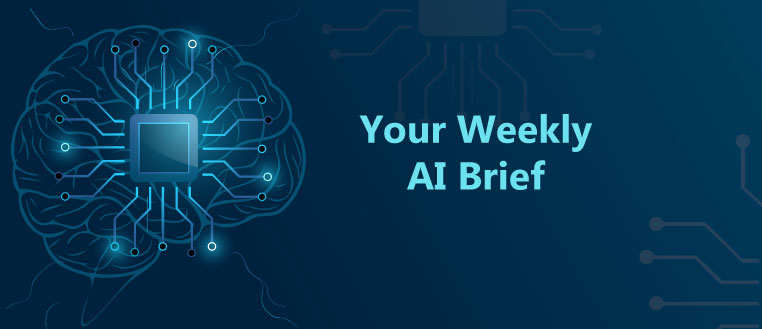Weekly Insights from NexaQuanta
We’re excited to bring you the latest edition of our Nexaquanta weekly newsletter, where we break down the most important updates shaping technology, AI, and digital innovation. Our goal is simple: to keep you informed with clear, concise insights that matter for your business and industry.
This week’s highlights include Microsoft’s new Content Marketplace, which helps creators monetize their work with AI firms, Google’s launch of an AI-focused hub for small businesses, and IBM’s ZipNN compression library, promising significant cost and speed benefits for AI models.
We also examine OpenAI’s ChatGPT Pulse, a feature designed to proactively deliver daily, personalized briefings. Together, these stories reflect how fast AI is evolving and the practical ways it’s reshaping business and technology.
Microsoft to Launch Marketplace for Publishers to Sell Content to AI Companies
Microsoft is preparing a new Publisher Content Marketplace (PCM), a platform where publishers can sell their content to AI companies for training chatbot models.
The marketplace will first be limited to a select group of publishers working with Microsoft’s Copilot assistant. Over time, it is expected to expand to more publishers and AI models.
Why It Matters
The rise of AI has created tension between technology firms and creators. AI developers require substantial amounts of human-generated content, while publishers and artists are pushing back against concerns over copyright and fair compensation.
Legal battles are already underway worldwide, with many tech giants, including Microsoft, facing lawsuits.
Possible Solutions
Microsoft has already signed licensing deals with news outlets to power its Copilot Daily service.
Other companies, like OpenAI, have also moved toward licensing models, while some, such as Perplexity, offer only usage-based revenue sharing. Content marketplaces like PCM aim to give creators more control and transparency.
The Bigger Picture
The marketplace could help strike a balance between innovation and creative rights. Although platforms like ProRata and TollBit remain small, Microsoft’s wide reach through Microsoft 365 and Azure could make PCM a stronger alternative.
At the same time, new tools, such as Cloudflare’s pay-per-crawl system, show that multiple approaches are being tested to ensure AI companies pay for the content they use.
Want to read more about this? Click here!
Google Launches AI Resource Hub for Small Businesses
Google has introduced a new Small Business Hub to help SMBs understand and adopt AI-driven tools. The platform offers guides, training resources, and links to various products, including Google Business Profiles, Merchant Center, Google Ads, and YouTube Ads.
What the Hub Offers
The site provides overviews of Google’s services, case studies, and practical tips. It also highlights AI and data tools designed to simplify advertising and improve online visibility.
Boosting SMB Growth
Google says digital tools are key to small business success. 82% of SMBs link revenue growth to digital ads, while 79% believe such tools help them compete with larger companies.
By embedding AI into its services, Google aims to make advanced marketing more affordable and effective.
A Starting Point for AI Adoption
For SMBs still exploring how to use AI, the hub offers free trials, training, and simplified guidance. It could serve as a first step for businesses that want to adopt AI without heavy investment.
Click here to read more about this news.
IBM Unveils ZipNN: Lossless Compression for AI Models
IBM researchers, collaborating with Boston University, Dartmouth, MIT, and Tel Aviv University, have developed ZipNN, an open-source compression library specifically designed for AI models.
The tool can reduce storage costs by up to a third and speed up model transfers by up to 150%, with no loss of performance.
How It Works
Traditional compression formats, such as ZIP, were not considered suitable for large AI models with billions of numerical weights.
But IBM researchers discovered redundancies in the exponents of model weights, where just 12 values appear 99.9% of the time. ZipNN uses entropy encoding, including Huffman encoding, to exploit this pattern and achieve significant reductions.
Results Across Models
ZipNN proved especially effective on BF16-format models such as Meta Llama, IBM Granite, and Mistral, reducing their size by 33%—an 11% gain over Meta’s Zstandard method.
Transfer speeds also improved, with Llama 3.1 models showing an average 62% boost. FP32 models saw smaller but still notable savings of 17%.
Beyond Storage
The research team also introduced a technique called byte grouping, which further reduces size by exploiting redundancies in fractions of model weights.
This approach cut Meta’s xlm-RoBERTa model by more than half. Hugging Face has since adopted byte grouping in its storage backend, reporting around 20% storage savings.
Want to know more about this? Click here!
OpenAI Introduces ChatGPT Pulse
OpenAI has launched ChatGPT Pulse, a new feature designed to proactively deliver daily updates based on a user’s preferences, history, and connected apps. Unlike traditional ChatGPT, which responds to prompts, Pulse initiates conversations with tailored content.
How Pulse Works
Each day, Pulse analyzes chat history, memory, and feedback, then performs asynchronous research.
The following morning, it provides a curated feed of visual cards—a personalized briefing that can include news, personal goals, calendar reminders, or even dinner ideas.
Smarter with App Integration
Users can connect Gmail or Google Calendar to make Pulse more useful. For example, it can surface restaurant recommendations for a trip, draft meeting agendas, or remind you of birthdays.
Updates refresh once a day and disappear unless saved, avoiding endless scrolling.
Why It Stands Out
OpenAI highlights that users remain in control. You can give feedback, clear history, and decide what Pulse covers.
By shifting from reactive to proactive assistance, ChatGPT is moving closer to acting as a true personal AI assistant, potentially competing with services like Google News or Apple News.
Check more details about this news here.
Stay Connected
Thank you for reading this NexaQuanta weekly letter. If you want to stay ahead with the latest AI and tech insights delivered straight to your inbox, be sure to subscribe to our NexaQuanta weekly newsletter. Don’t miss out on the trends and innovations driving the future of business.

